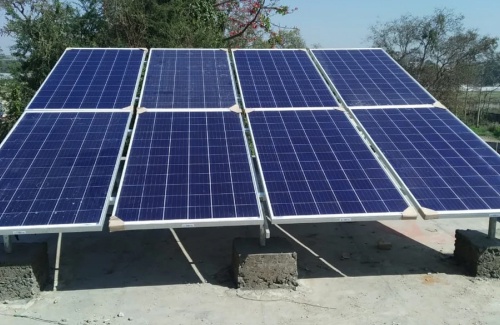Introduction:
The rising cost of traditional energy sources, coupled with increasing environmental awareness, has led many homeowners and businesses to explore alternative energy solutions. Solar rooftop systems have emerged as a sustainable and cost-effective way to generate electricity, providing numerous benefits, including significant savings on energy bills. This article delves into the various ways in which solar rooftop systems can save you money, making them a wise investment for both your wallet and the planet.
Free and Abundant Solar Energy:
Solar rooftop systems harness energy from the sun, a virtually limitless and free source of power. Unlike conventional energy sources that rely on fossil fuels and are subject to price fluctuations, sunlight is abundant and accessible to most regions throughout the year. By tapping into this clean and renewable resource, solar systems reduce reliance on grid electricity, translating into immediate savings on energy costs.
Reduced Electricity Bills:
One of the most direct and tangible benefits of installing a solar rooftop system is the immediate reduction in electricity bills. Solar panels generate electricity on-site, offsetting the need to purchase as much power from the grid. Depending on the system size and local solar conditions, homeowners and businesses can experience a substantial decrease in monthly electricity expenses.
Net Metering:
Many regions offer net metering programs, allowing solar system owners to receive credit for excess electricity they generate. During periods of high solar production, when the energy generated exceeds on-site consumption, the surplus is fed back into the grid. In return, the system owner receives credits that can be applied during times when the solar panels are not producing sufficient electricity, such as at night. This effectively reduces electricity bills even further.
Long-Term Financial Benefits:
While the initial investment in a solar rooftop system may seem significant, it is crucial to view it as a long-term financial asset. Solar panels have a lifespan of 25 years or more, and many manufacturers offer warranties for at least that duration. Over the system's life, the cumulative savings on energy bills often far exceed the initial installation costs, making solar a financially prudent choice in the long run.
Protection Against Rising Energy Costs:
Traditional energy costs are subject to inflation and market fluctuations, leading to unpredictable and potentially escalating bills. Solar rooftop systems provide a measure of stability by offering a fixed, upfront cost for energy production. By generating your electricity, you insulate yourself from future increases in utility rates, providing a hedge against rising energy costs and offering peace of mind regarding future expenses.
Tax Incentives and Rebates:
Many governments and local authorities encourage the adoption of solar energy by offering tax incentives and rebates to offset the initial costs of installation. These financial incentives can significantly reduce the overall expenditure on a solar rooftop system. Researching and taking advantage of available incentives can make the transition to solar power even more financially appealing.
Increased Property Value:
Homes and businesses equipped with solar rooftop systems often experience an increase in property value. Potential buyers are attracted to properties with lower operating costs, energy independence, and a reduced environmental impact. Studies have shown that solar installations can add value to a property, further contributing to the overall financial benefits of adopting solar energy.
Environmental Savings:
While the primary focus is often on financial benefits, it's crucial to acknowledge the environmental savings associated with solar rooftop systems. By generating clean energy and reducing reliance on fossil fuels, solar installations contribute to a lower carbon footprint. Some regions even offer environmental credits or incentives for adopting renewable energy, aligning financial savings with a positive environmental impact.
Minimal Operating and Maintenance Costs:
Solar rooftop systems have minimal operating and maintenance costs compared to traditional power sources. Routine maintenance, such as cleaning the solar panels and checking electrical components, is generally straightforward and affordable. The absence of fuel costs and the simplicity of solar technology contribute to the system's overall cost-effectiveness.
Grid Independence:
Solar rooftop systems provide a degree of energy independence by allowing homeowners and businesses to generate their electricity. While remaining connected to the grid provides a safety net during periods of low solar production, the ability to operate independently can be advantageous, especially in regions prone to power outages. This independence further contributes to long-term cost savings and energy security.
Technological Advancements and Cost Reductions:
Over the years, advancements in solar technology and increased production have led to a significant reduction in the cost of solar panels. As a result, the initial investment required for a solar rooftop system has become more accessible to a broader range of consumers. Additionally, ongoing research and development in the solar industry continue to improve efficiency, ensuring that newer installations are even more cost-effective.
Community and Corporate Benefits:
Beyond individual savings, the adoption of solar rooftop systems contributes to broader community and corporate benefits. Increased use of solar power reduces the overall demand for conventional energy sources, positively impacting the environment and reducing the strain on utility infrastructure. This, in turn, can lead to more sustainable and resilient energy systems for entire communities.
Conclusion:
Solar rooftop systems offer a multifaceted solution to the dual challenges of rising energy costs and environmental concerns. By harnessing the power of the sun, these systems provide immediate and long-term financial benefits, reducing electricity bills, offering protection against rising energy costs, and increasing property value. Government incentives, minimal operating costs, and advancements in solar technology further contribute to the cost-effectiveness of solar installations. Beyond the financial advantages, adopting solar energy aligns with a sustainable and environmentally conscious lifestyle, contributing to a cleaner and greener future. As technology continues to advance and awareness grows, the decision to invest in a solar rooftop system becomes not just a wise financial choice but also a responsible and forward-thinking commitment to a more sustainable world.


No comments yet